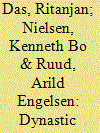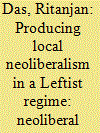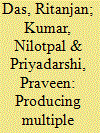|
|
|
Sort Order |
|
|
|
Items / Page
|
|
|
|
|
|
|
| Srl | Item |
| 1 |
ID:
193284


|
|
|
|
|
| Summary/Abstract |
This article contributes to the growing literature on political dynasticism in contemporary South Asia and shifts the focus from the much-debated national level dynasties to the usually ignored dynasties operating at subnational and regional levels. Analytically, it investigates the ‘moment’ of succession, conceptualised as the period when new heirs are actively enrolled in a dynastic formation. Such moments of succession can be perilous moments for dynastic formations, potentially disrupting its routine functioning style. And yet, these moments allow a clear identification and opportunity for analysis of the specific dilemma that all political dynasties have to negotiate. This dilemma can be described as follows: how to reconcile (1) the need to project emerging dynastic heirs as extraordinary beings embodying the special qualities of the original dynast, with (2) the equally pressing need to downplay inherited dynastic privilege – conceptualised here using Louis Dumont’s idea of ‘shamefacedness’ – often portrayed as an illegitimate source of power and influence in postcolonial South Asia. A successful succession, as this article argues, relies on the ability to negotiate this dilemma. To demonstrate this negotiation in practice, the article analyses two cases of dynastic succession: Abhishek Banerjee in West Bengal, India and Serniabat Sadiq Abdullah in Barishal, Bangladesh.
|
|
|
|
|
|
|
|
|
|
|
|
|
|
|
|
| 2 |
ID:
192297


|
|
|
|
|
| Summary/Abstract |
This article focuses on a relatively overlooked dimension of urban development in India: the nature of community-making in new urban spaces. Using concepts from sociological and geographical literature on community formation, it examines the relationship between specific forms of urbanisation in contemporary (neo-liberal) India and community-making processes. The study is situated in the city of Noida within the national capital region in northern India. Examining two habitational forms, that of urban middle-class enclaves and urban villages, we suggest that a model of urbanisation involving eminent domain (the state’s power to acquire private property and convert it into public use) to produce gentrified urban spaces may promote conditions for rival forms of exclusivist community-making, including nativist ‘othering’.
|
|
|
|
|
|
|
|
|
|
|
|
|
|
|
|
| 3 |
ID:
168569


|
|
|
|
|
| Summary/Abstract |
This paper presents a theoretical reassessment of a contentious chapter in India’s economic liberalisation – the case of West Bengal, a state ruled by the pro-labour ‘Left Front’ coalition, led by the Communist Party of India-Marxist (CPIM) from 1997 to 2011. The onset of neoliberalism in India had naturally created a serious political dilemma for the CPIM, but it eventually transitioned to a private-industrialisation agenda, thus prompting serious questions of ideological deviation. While the political-economy of the CPIM/Left Front and its industrial fortunes have been extensively scrutinised, this study introduces a rather different theoretical perspective to the story. Going back to the initial period of policy transition (c.1994), it uses the analytical categories of local neoliberalisms and populist transition to show how the state of affairs in West Bengal under the CPIM was demonstrative of a particular variant of interventionist neoliberal governmentality, characterised by a gradual intensification of pro-market impulses. Furthermore, the study also contextualises West Bengal within wider political economic trends, arguing that pro-market transitions by populist regimes tend to be characterised by a series of mobile calculative techniques of governing, embedded in local historical and geographical specificities and localised relationships.
|
|
|
|
|
|
|
|
|
|
|
|
|
|
|
|
| 4 |
ID:
183483


|
|
|
|
|
| Summary/Abstract |
This article examines two simultaneous dynamics in contemporary India: the development of new urban spaces, and an intensification of Hindu nationalism (Hindutva). Examining the case of Noida (a township adjacent to Delhi), this article suggests that the entrepreneurial mode of urban development [Harvey 2006. Spaces of Global Capitalism. New York: Verso] has restructured local spaces, which in turn may give rise to rival attempts at group making, seeking to recreate exclusive identities out of choice and resentment to mobilise political action. Such rival attempts may enable Hindutva to entrench itself in local milieus through multiple modes, including the soft mode of ‘neo-Hindutva’. Overall, the article outlines the dynamic association between new urban processes and exclusivist/nativist forms of politics in contemporary India.
|
|
|
|
|
|
|
|
|
|
|
|
|
|
|
|
|
|
|
|
|